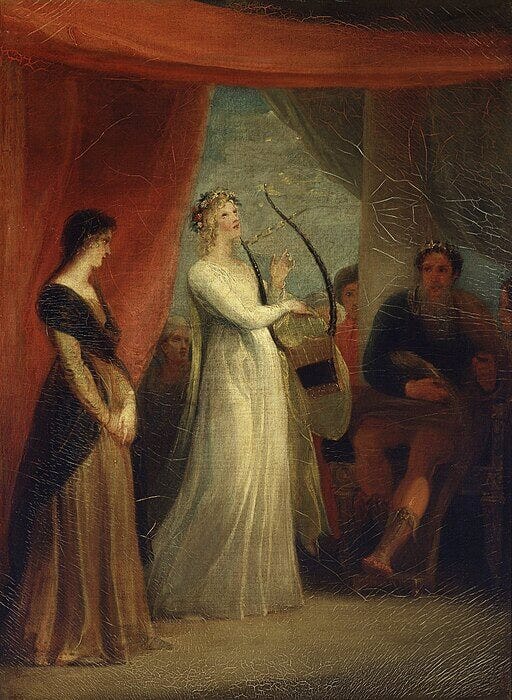
I’ve been lingering quite a lot over Shakespeare’s late romances recently and Pericles, Prince of Tyre falls into this bracket along with Cymbeline. It also shares themes with The Winter’s Tale, The Tempest and Measure for Measure. It’s now thought that it was a collaboration between Shakespeare and a man called George Wilkins: a disreputable character who worked as an innkeeper and writer (Wilkins is known to have produced a prose romance in 1609 which is very close to the play - a sort of novelised version, if you’ll excuse the anachronism).
The play is a ‘romance’ in the sense that it’s an episodic narrative with a wandering protagonist, much like the old tales of chivalry were. (Wilkins/Shakespeare may have had these stories in mind because they added a jousting scene which does not appear in the source material.) Despite not being included in the First Folio, Pericles was very popular; in fact, it was probably Shakespeare’s most popular play of the 17th century (it was published under his name only). Ben Jonson called it a “mouldy tale” - partly because it’s based on a text from the second century called The Adventures of Apollonius of Tyre, and partly because he was annoyed that it was taking custom away from his own masques.
The play begins with a distasteful story about King Antiochus, who is having an incestuous relationship with his daughter (not named). This daughter is wooed by many men, but the King has ruled that each man must answer a riddle, and if they get the answer wrong, they are to be beheaded. Pericles duly arrives at Court in order to win the Princess’s hand and sees at once that the riddle - which reveals the incest between father and daughter - is a kind of double-bind. Whatever happens - whether he speaks the truth or refuses to answer - he will be killed, so he flees, thus beginning a journey that takes him across the sea to many different lands.
From this point onwards, the plot is packed with action - there are pirates, jousts, shipwrecks, a brothel scene, tragedy and a miraculous ending. Up until Act Three (the part where most people believe Shakespeare enters as co-writer) the dialogue is workaday, but as soon as we hear Pericles, who is on-board a ship in a storm, pleading with the elements, Shakespeare’s voice breaks forth like the sun emerging from clouds:
The god of this great vast, rebuke these surges
Which wash both heaven and hell; and thou that hast
Upon the winds command, bind them in brass,
Having call’d them from deep! O, still
Thy deaf’ning, dreadful thunders; gently quench
The nimble sulphurous flashes!
The breathlessness of the verse is similar to the speech in Act Three, Scene Two of King Lear:
Blow, winds, and crack your cheeks! rage! blow!
You cataracts and hurricanoes, spout
Till you have drench’d our steeples, drown’d the cocks!
The brothel scene in Pericles, meanwhile, has all of Shakespeare’s naturalism, recalling some of the Falstaff episodes from Henry V. But the real heart of of the play is Act Five, Scene One, when the protagonist is reunited with his (supposedly dead) daughter, Marina. Here we have a lyricism that recalls the end of The Winter’s Tale. In his grief, Pericles has withdrawn from society; not only has he refused to shave - a symbol of mourning - but he has stopped speaking. As his trusty lord, Helicanus (who is effectively ruling Tyre) sadly explains: “This was a goodly person, / Till the disaster that, one mortal night, / Drove him to this”.
But such is Marina’s goodness that she is brought to “win some words of him”. The joy of this scene is the slow awakening of Pericles to the truth - that this young woman is the daughter whom he thought he had lost:
Per. I am great with woe
And shall deliver weeping. My dearest wife
Was like this maid, and such a one
My daughter might have been: my queen’s square brows;
Her stature to an inch; as wand-like straight;
And silver voic’d; her eyes as jewel-like
And cas’d richly; in pace another Juno;
Who starves the ears she feeds, and makes them hungry
The more she gives them speech.

Harold Bloom declared that Pericles is the only play of Shakespeare’s that he would rather watch than re-read and this sentiment frequently comes up in other assessments of the work. On the page it’s sometimes plodding, and the central protagonist is oddly one-dimensional, but in the theatre it transforms (by some strange alchemy) into an entertaining and colourful tale. Given its rarity, I was excited to see the Royal Shakespeare Company staging it recently and lost no time in booking tickets. This production marked Tamara Harvey’s directorial debut as one of the two Co-Artistic Directors of the RSC, and made a nice pairing with Gregory Doran’s last production for that company (2023’s Cymbeline).
With an affecting performance from Alfred Enoch as Pericles, it was an entertaining watch - Harvey has worked with a small cast who doubled-up (sometimes tripled-up) on roles, presumably because the production is transferring to the Chicago Shakespeare Theater after its run in the UK. The set was similarity spartan - mainly ropes suggesting the rigging of a ship and some exotic lamps - and the drama was nicely underscored by live music - an important element of Pericles, especially in Act Five when the hero (literally) hears the music of the spheres:
Most heavenly music!
It nips me unto list’ning, and thick slumber
Hangs upon my eyes; let me rest.
I’m too late with this review for you to catch it in Stratford-upon-Avon (it finished yesterday) but perhaps a trip to Chicago might be in order?





I saw Pericles at the Atlanta Shakespeare theater during my college days and loved it. Glad to see it is still being performed!